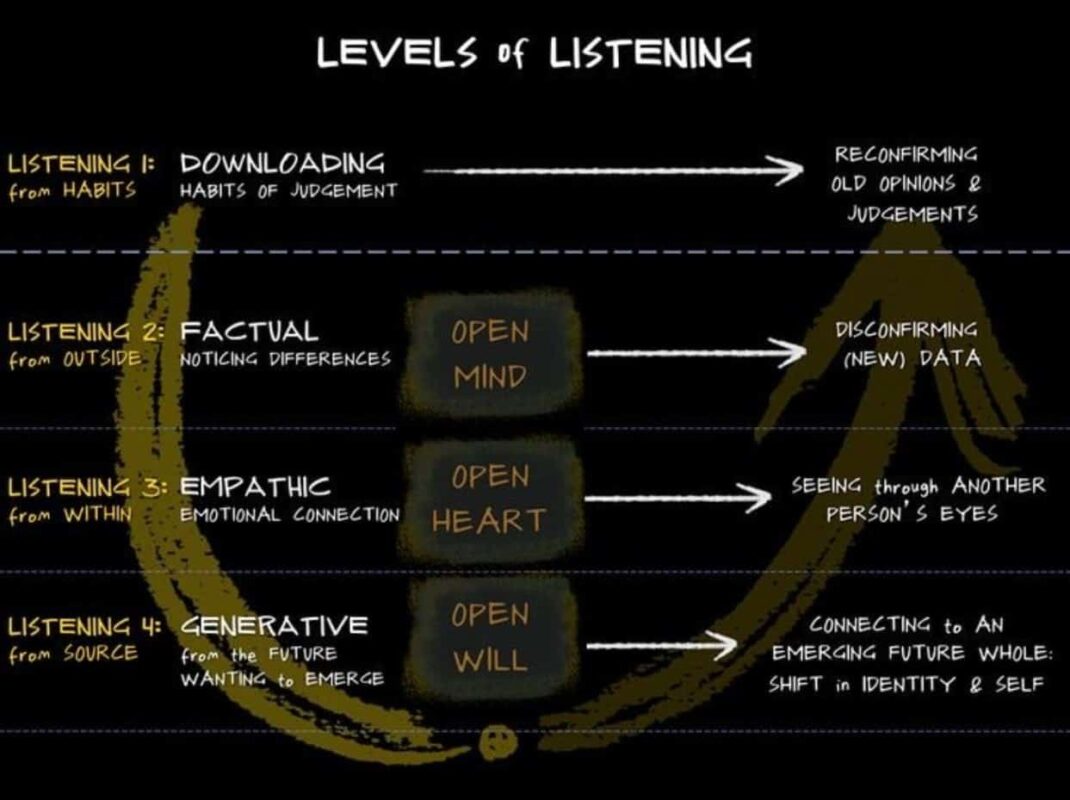As our field of international development lurches in fits and starts toward more egalitarian partnerships with country stakeholders — as called for in USAID’s localization agenda and Local Capacity Strengthening Policy — there is universal agreement that new skills, capacities and positioning are needed from international organizations like Creative if the new vision is to succeed.
This newer (or different) skill set has generally been called “relational capacities,” or “facilitative” versus “directive” skills, as described in USAID’s policy. But there has been little discussion of what comprises these skills, and how they can enhance our development work.
What core skills should we strengthen to be more successful in our systems practice?
While a clearer idea of the full range of skills needed will emerge as we learn by doing, it is certain that one of these critical skills is listening.
Why listening? First, listening is a fundamental way that we can truly learn about the lived realities of others. Second, it is vital to build socio-emotional bonds, trust and credibility with others. If you think back to when you have felt truly listened to, perhaps by a coach, mentor or close friend, you probably have positive feelings towards and trust of that person who gave you the gift of time and attention to listen without judgment, unsolicited fixes, unwanted advice or checking their phone.
Kate Murphy’s book, You’re Not Listening: What You’re Missing and Why it Matters, noted that listening is often overlooked and underestimated. U.S. culture tends to prioritize speaking and acting—dazzling the audience with your words—rather than listening well. And in today’s dizzying, media-saturated culture, connection is often substituted for actual and authentic listening.
Murphy describes a moment in Facebook history when Mark Zuckerberg went on a showy “listening tour” and became the object of online mockery because he didn’t seem to know the difference between contrived or false listening and authentic or active listening. Humans are pretty good at detecting when someone is listening for show, versus actual listening. Head nodding and frozen eye contact are not listening.
Authentic listening involves ego suspension, generous spacious attention and patience. Listening well brings about appropriate and authentic response to the deeper levels of what a speaker is trying to communicate, even if it is neither elegantly nor succinctly expressed. (Since when have the most difficult things we need to communicate ever been so? Only in the movies!)
Listening well has everything to do with our leadership and communication. “The best communicators, whether addressing a crowd or a single individual, are people who have listened, and listened well, in the past and continue to listen in the moment…[they remain] attuned to their audience while they are speaking, paying attention to verbal and nonverbal cues as well as the energy in the room to assess whether people are following them and care about the subject,” Murphy wrote in her book. Therefore, to communicate and lead, we must listen – and listen extremely well.
What does listening have to do with systems practice, localization and capacity?
As a matter of strategic policy, USAID has called for deeper listening and partnerships with local organizations, centering their needs, their priorities, their pace of change and their capacity development.
If this mandate gives rise to a transformed world of international development with new norms and processes, what will listening look (and sound) like?
One useful framework comes from Otto Scharmer, co-founder of The Presencing Institute, who has spoken about listening as the most critical skill in organizational and systems change. He provides a listening framework involving four levels:
- Level 1: Downloading (Listening from Habits)—Listening to and for what you already know. Results in reconfirming old opinions and judgments.
- Level 2: Factual listening (Listening from Outside)—Listening with an open mind for disconfirming data (a process which can produce new data). Scientific mindset.
- Level 3: Emphatic listening (Listening from Within)—Listening with an open heart to the experience of another person, making an emotional connection.
- Level 4: Generative listening (Listening from Source)—Connecting to an emerging future possibility which involves a shift in identity and self.
Creative has begun to apply listening practices—listening is both an art and a practice—to our own organizational change processes. For example, our Office of Innovation has reflected on levels of listening in recent team-building and visioning workshops. Spaces we open for listening are not just about exchanging our ideas but also about recognizing the assets and value of all the members and teams that comprise the new office.

Creating spaces for authentic listening also happens at the project level. For example, in our governance and stabilization work, FRAMe® is a social technology that allows local government leaders to listen to citizens in new ways, to “flip the camera around,” so to speak. In El Salvador when local council members reviewed the findings from the FRAMe® focus groups held with different constituencies, one leader indicated that this was the first time he had thought about what the citizens think about them (the council) or what they wanted from the council in terms of governance.
He said he always thought of citizens as just “demanding things.” Debby Kimble, Creative’s former Practice Area Director for Democracy, Governance and Electoral Integrity, reflected on this insight: “I think sometimes listening is a function of the question asked.” That is, the kinds of questions we help local actors ask of each other can be transformative, and the environments and methods we use to hold that space for authentic listening are critical to meaningful systems change.
As the localization process unfolds, I challenge us to sense, reflect on and share these moments of transformational dialogue as they emerge from our project experience, as these are truly the sparks of systems change.
Clare Ignatowski, Ph.D. is the Senior Technical Advisor for Systems Thinking in Creative’s Knowledge Management Department. Clare also serves on the Executive Committee of USAID’s Bungee Book Club, which selected Kate Murphy’s You’re Not Listening as its read in Spring 2022.